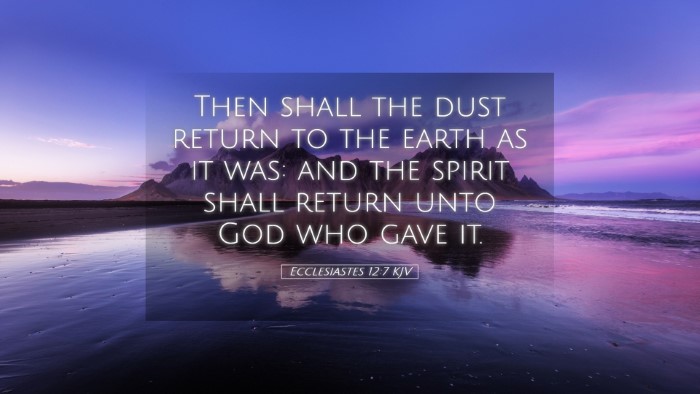Old Testament
Genesis Exodus Leviticus Numbers Deuteronomy Joshua Judges Ruth 1 Samuel 2 Samuel 1 Kings 2 Kings 1 Chronicles 2 Chronicles Ezra Nehemiah Esther Job Psalms Proverbs Ecclesiastes Song of Solomon Isaiah Jeremiah Lamentations Ezekiel Daniel Hosea Joel Amos Obadiah Jonah Micah Nahum Habakkuk Zephaniah Haggai Zechariah MalachiEcclesiastes 12:7
Ecclesiastes 12:7 KJV
Then shall the dust return to the earth as it was: and the spirit shall return unto God who gave it.
Ecclesiastes 12:7 Bible Commentary
Ecclesiastes 12:7 - Commentary
Bible Verse: "And the dust returns to the ground it came from, and the spirit returns to God who gave it."
Overview
This verse serves as a poignant conclusion to the reflections of Ecclesiastes, encapsulating the themes of mortality, the transient nature of life, and the eternal aspect of the spirit. The verse articulates the cycle of life—where the physical body, made from dust, returns to the earth, while the spirit returns to God. Understanding this duality is crucial for deeper theological reflection and pastoral application.
Insights from Public Domain Commentaries
Matthew Henry's Commentary
Matthew Henry emphasizes the solemnity of human life and its inevitable end. He notes that “the dust returns to the ground” signifies the mortality of humans, relating back to Genesis 3:19, where God tells Adam, "For dust you are, and to dust you shall return." This reminds believers of human frailty and the necessity of humility in their lives.
Henry further highlights the significance of the spirit's return to God. He asserts that this aspect reinforces the belief that our existence encompasses not just physical life but also spiritual reality—a truth that prompts individuals to live with purpose, focusing on eternal matters rather than earthly pursuits.
Albert Barnes' Notes on the Bible
Albert Barnes elaborates on the duality of existence presented in this verse. He posits that the verse succinctly summarizes the fate of mankind: the body is temporal, while the spirit demonstrates the eternal essence of human beings. Barnes provides a theological perspective on the spirit's return to God, interpreting it as an acknowledgment of divine sovereignty over life and death.
Furthermore, Barnes comments on the necessity of considering one's spiritual state before this returning occurs, suggesting that individuals should evaluate their lives in the context of eternity. This contemplation encourages believers to aspire to align their lives according to God’s will, thereby enriching their spiritual journey.
Adam Clarke's Commentary
Adam Clarke brings an additional layer of meaning to this verse by discussing the notion of the spirit's return to God. He asserts that this return signifies a future reckoning, where human souls will be held accountable for their lives on earth. Clarke underscores that this idea is rooted in a broader biblical framework where one's deeds and intentions matter significantly to God.
In his reflections, Clarke encourages believers to maintain a robust understanding of life’s temporal nature juxtaposed with the eternal stakes of spiritual existence. He calls for a life of wisdom and righteousness in anticipation of the inevitable meeting with God post-mortem.
Theological Implications
The theological implications of Ecclesiastes 12:7 extend beyond mere acknowledgment of mortality. It challenges readers to contemplate the relationship between the physical and spiritual realms. The verse provokes critical questions:
- What does it mean to live knowing that our physical bodies are temporary?
- How should the acknowledgment of a returning spirit alter our daily lives and priorities?
- What hope and assurance do believers have in the context of this return to God?
Pastoral Applications
For pastors and leaders, Ecclesiastes 12:7 can be a foundational text for teaching on human mortality, the importance of living a life aligned with God's purposes, and the hope we have beyond the grave. Pastoral applications may include:
- Funeral Sermons: Using this verse to remind the grieving of the hope of resurrection and the presence of God beyond this life.
- Discipleship Programs: Integrating discussions about life’s purpose and the eternal implications of our actions in training believers.
- Personal Spiritual Reflection: Encouraging individuals to assess their spiritual state, preparing for their ultimate return to God.
Reflection for Theologians and Scholars
Theology students and scholars will find Ecclesiastes 12:7 rich for exploration. The verses offer opportunities to examine:
- The doctrine of creation and the nature of humanity as both physical and spiritual beings.
- The eschatological implications regarding the afterlife and God's judgment versus human existence.
- The coherence of this verse with other biblical texts that speak on creation, mortality, and the soul's destiny.
Conclusion
Ecclesiastes 12:7 encapsulates the weighty truth that, while humanity experiences the transience of life, there exists an enduring spirit that returns to God—the source of all existence. This duality invites believers to pursue a life of wisdom, humility, and purpose that acknowledges both the fleeting nature of their earthly journey and the promise of eternity with their Creator. The verse challenges individuals across all stages of faith to live with intentionality, recognizing the profound reality of their spiritual existence.


